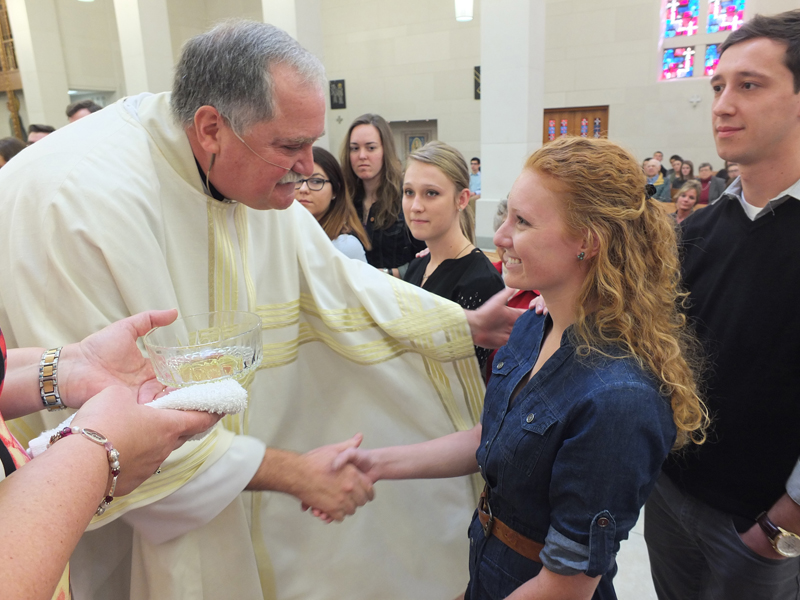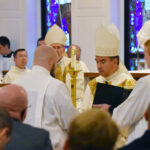By Fr. Joe DeFrancisco
This Lenten series is an effort to argue for a meaningful and necessary connection between the theology and liturgy of sacramental life and the apostolic work of peace, justice and universal love in the world. The “universal call to holiness,” outlined in The Vatican II Dogmatic Constitution on the Church, defines the mission of baptized Christians within the church as a people united in prayer, sacrament and Eucharist through the divine indwelling of the Holy Trinity. The common “priestly” mission of all Christians is spiritually and sacramentally grounded in the person of Jesus Christ who, through the Holy Spirit, empowers the faithful to evangelize the message of Jesus in the power of proclaiming the Word of God and in actively growing the Kingdom of God throughout the world. By immersing ourselves into the sacramental life of the church, celebrated in the liturgy and witnessed in concrete apostolic action, each baptized Christian and the church as a whole grows in spiritual maturity (D.C.C.1.4-6). More precisely, the church as a fellowship of love and communion answers Jesus’ command in Matt. 5:48, “you must be perfect as your Father in heaven is perfect.” Jesus’ Jewish understanding of holiness and perfection was and is repeated each day through the morning prayer of the “Shema Israel” (Deut. 6:4-7). “Hear O Israel, You shall love the Lord your God with all your mind and heart and soul, and you shall love your neighbor as yourself.” This periscope appears to be so ordinary and self-evident in the life of the Jews in Jesus’ time. But it was not enough for Jesus, who then gave a prophetic warning: “Unless your holiness and righteousness surpasses that of the Pharisees, you will not enter into the Kingdom of God” (Matt. 5:20). John the Baptist understood clearly his own calling: “I have baptized you with water; He will baptize you in the Holy Spirit” (Matt. 3:11). Chapter five of the Dogmatic Constitution on the Church beautifully crafts a full theology of confirmation, or life in the Spirit, as it assures the church that the Holy Spirit is inspiring and leading its members through an “interior” grace of union with and love for God. The spiritual power of this inner bond of love strengthens us to be drawn into the process of sanctification.

Leah Poss shakes hands with Father Chuck Adam as she celebrates her confirmation during an Easter Mass at St. Ambrose University in Davenport last year. Her sponsor was Kevin Beckett, right.
As the liturgies of baptism and confirmation anoint us to “put on the Person of Jesus Christ” (Rom.13:14), St. Paul challenges the converts of Ephesus as “chosen ones of God” to exercise the virtues of unity, holiness, compassion, kindness, meekness, humility and patience. These are some of what St. Paul defines as “first fruits of the Spirit,” already defined by Jesus in the Sermon on the Mount.
Jesus promised his apostles that the “kerygma” or inspired teaching he would give them, the many paradoxical teachings, the New Law, the “hidden” meaning of the parables, are not realities they would clearly understand while he was with them ministering in the marketplace.
The lengthy theology of St. John’s Gospel, Chapter 16, revealed to them the true nature, meaning, power and empowerment of the Holy Spirit. They must wait for a future divine manifestation, one that they would dramatically experience in the event of Pentecost. Dietrich Bonhoeffer sheds a different light on what he believes Jesus required of apostles in preparation for a new life in the Spirit. Jesus taught them to embrace a life of Beatitudes.
Their new mission would require them to self-surrender and to be open to the Holy Spirit. They were to become his living presence in a sinful broken world. They were expected to first acknowledge and own their sinfulness and evil inclinations. They were invited to live simply, to experience being marginalized and rejected. They would have to endure pain, humility, powerlessness, hunger, deprivation and every manner of human temptation. If the apostles and disciples were meant to be a transforming presence in the world, guided by the Spirit, they would have to live within their bodies the pain, suffering, injustice and deprivation of the countless human beings they were called to serve.
Building up the Kingdom of God on earth is not simply a call to prayer, or a mandate to do service, but a risky and sometimes dangerous union to the people being rejected, marginalized and killed. Pope Benedict in his compelling Encyclical, “Caritas in Veritate,” synthesizes decades of papal and magisterial teaching reminding Christians that the heart and center of Christian life is the exercise of unconditional and self-sacrificing love, celebrated as a Eucharistic community. However, this love requires an expression and mission expressed in the works of justice. Consequently, the church must continue to define its future mission as “preferential option for the poor.”
In essence, all Christians must understand that without persistent efforts to reconcile and heal the world’s social injustices and economic/political evils, the transforming love of Christ may not bring the fullness of hope or the healing of global anguish in the modern world ( Decree on the Church in the Modern World, 1.4).
(Fr. Joseph DeFrancisco, S.T.D., is a professor of theology and pastoral studies at St. Ambrose University in Davenport.)











